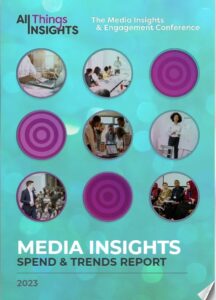So where does that leave the insights function? For many executives, it might mean business as usual. For others, there is a “keep the lights on and products on the shelves” mentality. For still others, there is a need to prioritize and adapt their leadership and management roles as uncertainty reigns supreme. Uncertain times tend to overstrain resources, personnel and company departments, from supply chain and procurement to insights and strategy. Leaders need to adapt and respond to ongoing crises.
Comfort with Ambiguity
As far as the ambiguity of uncertain times, some suggest that executives use that very ambiguity to their advantage. With a lack of data into the future, leaders may be prone to be in a position where they find it difficult to act. Insights are part of their arsenal of tools, from analytics to machine learning, that help support solid decision making. But murky times may mean murkier data.
In a recent post, “Flourishing in Ambiguity,” Deloitte argues, however, that in situations like this, it may be best to act first and decide later. “Rather than deciding to act, we should consider acting to decide. Instead of committing to one “best” option based on available data, we could invest in the many small actions that help improve our understanding of the current situation and foster the discovery and development of all options, the possibilities, available to us.”
As our understanding improves, some options may fall by the wayside, while others will transform into decisive action. Comfort with ambiguity may follow this path of small steps, rather than making just one big leap. “Comfort with ambiguity can come from the confidence that one knows how to productively engage with it. And productively engaging with ambiguity often requires balancing our bias for committing to a single course of action with a bias for learning and exploration—taking smaller actions to determine the best way forward,” Deloitte notes.
Certain Uncertainty
A recent post, “Certain Uncertainty,” on All Things Innovation further looks at the question of certain uncertainty. Seth Adler discusses how to grapple with uncertainty with forecaster, futurologist and author Magnus Lindkvist. Lindvkist aims to help understand how unexpected things happen and how they affect us as individuals, groups, and societies. Based on research and interviews with people whose lives have been “attacked” and deeply changed by the unexpected, his book tries to help you get over your fear of the unknown by teaching you to embrace it and use it to your advantage. It does this by walking you through the “uncertainty reframe” process, which involves rethinking your perspective and attitude toward uncertainty. Check out “Certain Uncertainty” on All Things Innovation.
Staying Resilient When Facing Uncertainty
Acting to decide requires insights leaders to have courage, commitment, and knowing when to pivot. Uncertainty and ambiguity could move the needle from challenges to opportunities, from indecisiveness to the small steps leading to creativity and innovation. A recent query on ChatGPT gave us a few other pointers in how insights executives can deal with the certainty of uncertainty:
- Stay informed: Keep up to date on the latest news in your industry and related sectors, as well as any changes that might affect you or your company.
- Prepare for multiple scenarios: Think through how each event could impact your business, and create plans of action accordingly. Consider developing a range of strategies to cope with different levels of uncertainty so you’re ready for anything.
- Leverage technology: Take advantage of data analysis tools such as predictive analytics and machine learning to help better understand customer behavior patterns and identify potential risks before they become problems.
- Prioritize communication: Make sure everyone is on the same page when it comes to understanding new developments, processing information quickly, making decisions efficiently, and responding appropriately in times of uncertainty.
- Focus on resilience: Developing strong organizational resilience can help mitigate risk by enabling teams to adapt quickly during difficult times while maintaining focus on long-term goals—even in uncertain environments.
As McKinsey writes in an analysis on uncertainty, “How can you deliver value amid uncertainty?” For one thing, insights executives must at times implement new forms of leadership, new ways of working, and new operating models to cope with an uncertain future. McKinsey further notes that some keys to managing uncertainty, one must prepare for numerous outcomes; take a creative approach to problem solving; develop new operating models if necessary to respond to different levels of uncertainty; and build a more empowered marketing resource management function.
Contributor
-

Matthew Kramer is the Digital Editor for All Things Insights & All Things Innovation. He has over 20 years of experience working in publishing and media companies, on a variety of business-to-business publications, websites and trade shows.
View all posts


































































































